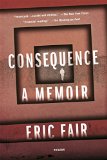Summary | Excerpt | Reviews | Beyond the Book | Read-Alikes | Genres & Themes | Author Bio

A Memoir
by Eric FairThis article relates to Consequence
Consequence author Eric Fair first prepared for his role as an interrogator by enrolling in the Defense Language Institute Foreign Language Center (DLIFLC).
According to its website, the DLIFLC is the "premier school for culturally based foreign language education and training, with classroom instruction, mobile training teams, and online materials tailored for students at all levels of required proficiency or performance." It's located on the Presidio in Monterey, CA. Although the Presidio is a U.S. Army post and the DLIFLC is run by the Army, it's considered a "joint-service" school and is attended by members of all branches of the military service as well as select individuals sponsored by government agencies such as the National Security Administration (NSA).
The DLIFLC was created during WWII to fill the need for Japanese translators. The school was considered top secret, and when it opened on November 1, 1941 it had only four instructors and 60 students, most of whom were second-generation Japanese Americans ("Nisei") who already had some understanding of the language. In 1946 it was moved from the Presidio of San Francisco to its current location to support the study of Cold War languages. Over time, the school's offerings have changed to reflect the U.S. government's global priorities, for example shifting to Vietnamese during the 1970s and to Arabic during Fair's time in the service.
It currently accommodates approximately 3,500 students and holds classes on 22 different languages; courses can run anywhere from 26 weeks for more common languages such as Spanish or French, up to 64 weeks for the more demanding ones such as Korean or Arabic. As part of each candidate's training, the school provides instruction on culture, customs, religion, geography and socio-economic conditions of the population being studied. Instructors are almost always native speakers of the language they're teaching.
The institute is comprised of eight schools of undergraduate education, each of which is headed by a civilian dean who's responsible for "planning and implementing assigned programs in foreign language training and curriculum development, implementing academic and administrative policy, and managing the school's annual manpower and budget allocations." An associate dean who is always a senior military officer assists the dean, monitors student progress and directs the school's Military Language Instructor Program.
As part of the enlistment process a recruit who's interested in becoming a linguist has to take the Defense Language Aptitude Batter (DLAB), a 126-question multiple choice test with five audio sections and one visual section. The DLAB is designed to determine a recruit's ability to learn a language category rather than current fluency in any one language.
Recruits with aptitude and interest are enrolled in the program, but first must complete basic training. Most of the drill sergeants have been or currently are instructors, and have been students at the DLIFLC at least once. A language class can have 40-60 students which is further divided into sections of no more than 10 students each. Each section will have four to six teachers throughout the week, and once the individual is placed, instruction is immersive and incredibly fast paced. Tests are constant and students are frequently ejected from the program for poor performance.
Graduates are required to take a Defense Language Proficiency Test (DLPT) annually to assess their qualifications and to set their Foreign Language Proficiency pay. Military Language Analysts are required to maintain an "Advanced" status in both listening and reading proficiency to maintain their posts.
Filed under Places, Cultures & Identities
![]() This "beyond the book article" relates to Consequence. It originally ran in May 2016 and has been updated for the
April 2017 paperback edition.
Go to magazine.
This "beyond the book article" relates to Consequence. It originally ran in May 2016 and has been updated for the
April 2017 paperback edition.
Go to magazine.
Your guide toexceptional books
BookBrowse seeks out and recommends the best in contemporary fiction and nonfiction—books that not only engage and entertain but also deepen our understanding of ourselves and the world around us.